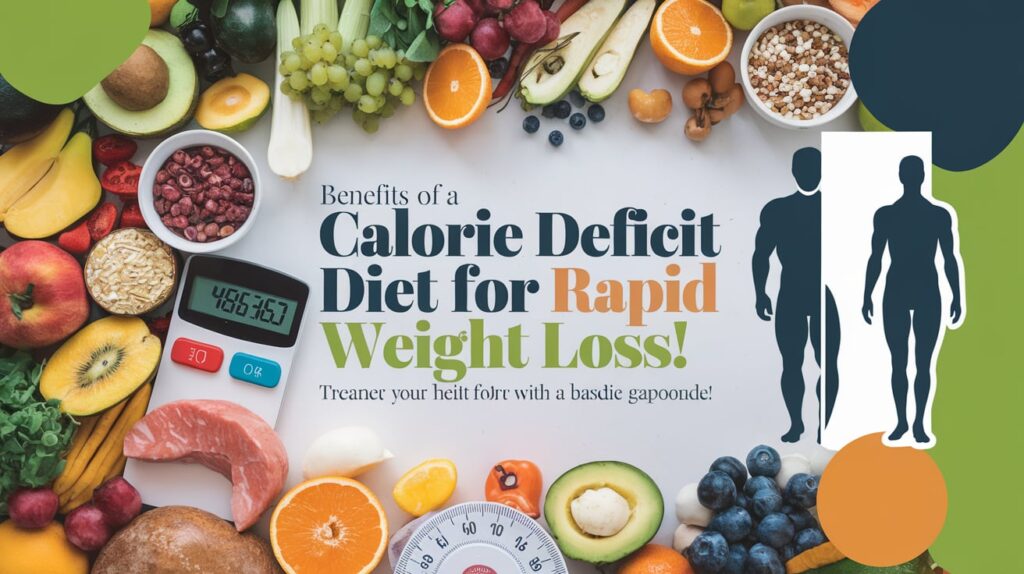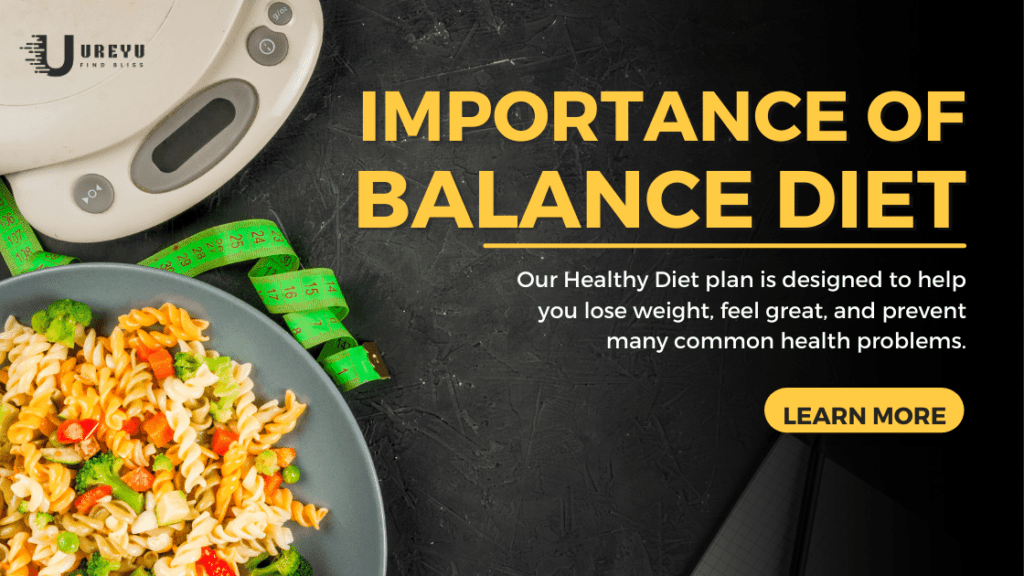Transform Your Health: Uncover the Surprising Benefits of a Calorie Deficit Diet for Rapid Weight Loss!
Weight loss is often a primary goal for many individuals striving for better health. At the heart of most successful weight loss regimens lies a fundamental principle: being in a calorie deficit. In this blog post, we will explore the concept of a calorie deficit diet, detailing how you can implement it for rapid and sustainable weight loss, while unveiling the unexpected health benefits that accompany this dietary approach.
Table of Contents

What Is a Calorie Deficit, and How Much of One Is Healthy?
Definition
A calorie deficit occurs when you consume fewer calories than your body needs to maintain its current weight, prompting it to burn stored fat for energy. This principle is essential for weight loss, as it forces your body to utilize fat reserves to meet its energy requirements.
Calculation
To establish a calorie deficit, you need to determine your Total Daily Energy Expenditure (TDEE). This is the number of calories your body needs to maintain your current weight, accounting for all daily activities and bodily functions. By consuming fewer calories than your TDEE, you create a calorie deficit.
Healthy Range
A moderate calorie deficit of 500 to 1,000 calories per day is generally considered safe and effective. This deficit facilitates a gradual weight loss of about 1 to 2 pounds per week, which is sustainable and less likely to cause adverse health effects.
Risks of Excessive Deficits
While a larger calorie deficit might seem like a quicker route to weight loss, it can lead to muscle loss, nutritional deficiencies, and a slowed metabolism. These adverse effects can undermine long-term weight loss goals and overall health.
Individual Factors
The appropriate calorie deficit can vary based on factors such as age, gender, weight, activity level, and overall health. Tailoring the deficit to individual needs is crucial for achieving safe and effective weight loss.
– Age: Metabolism generally slows with age, affecting calorie requirements.
– Gender: Men typically have higher caloric needs due to more muscle mass.
– Weight: Heavier individuals may require a greater deficit to see changes.
– Activity Level: More active individuals burn more calories and may need a smaller deficit.
– Overall Health: Underlying health conditions can impact caloric needs and should be considered.
By understanding these elements, you can develop a personalized calorie deficit strategy that optimizes weight loss while maintaining health.
What Should Your Calorie Deficit Be?
Tailored Calorie Deficit
A key step in creating a safe and effective calorie deficit is to tailor it based on personal factors such as age, gender, weight, height, and activity level. This personalization helps to ensure that your diet meets your specific health and fitness goals.
Moderation is Key
Aiming for a moderate calorie deficit of 500-750 calories per day is advisable. This approach typically results in a sustainable weight loss rate of 1-1.5 pounds per week, which is both healthy and manageable.
Nutrient-Dense Foods
Focusing on nutrient-dense foods is essential when maintaining a calorie deficit. These foods provide the necessary vitamins and minerals your body needs without excessive calories.
Monitor Progress
Regularly tracking your weight loss progress is crucial. Adjusting your calorie intake as needed can help prevent plateaus and ensure continued progress in your weight loss journey.
Avoid Extreme Deficits
Extreme calorie deficits should be avoided, as they can lead to muscle loss, nutritional deficiencies, and a slower metabolism. Balanced, moderate deficits are more conducive to long-term success.
– Regular Check-Ins: Weigh yourself weekly or bi-weekly to monitor changes.
– Adjust Intake: Modify caloric intake based on progress and energy levels.
– Listen to Your Body: Adjust your diet and exercise plan if you experience significant fatigue or other negative symptoms.
By following these guidelines, you can create a personalized and balanced approach to achieving and maintaining a healthy calorie deficit.
How to Reach a Calorie Deficit to Lose Weight

Understand Your Basal Metabolic Rate (BMR)
Calculating your BMR helps determine the number of calories your body needs at rest. This aids in setting a realistic daily calorie intake goal, forming the foundation for a successful calorie deficit diet.
Incorporate Physical Activity
Combining your diet with regular exercise increases the number of calories burned, enhancing the effectiveness of your calorie deficit. Physical activity not only assists in weight loss but also promotes overall health and well-being.
Track Your Food Intake
Using apps or food diaries to meticulously record your food and beverage intake ensures you stay within your calorie limits. This practice fosters accountability and consistency, which are key to effective weight loss.
Choose Nutrient-Dense Foods
Opting for whole foods like fruits, vegetables, lean proteins, and whole grains provides essential nutrients without excess calories. These choices support a balanced diet conducive to sustained weight loss.
Be Mindful of Portions
Paying careful attention to portion sizes helps prevent overeating, even with healthy foods. Maintaining a calorie deficit requires careful management of the quantity of food consumed.
– Use Smaller Plates: Trick your brain into feeling satisfied with smaller portions.
– Measure Portions: Use measuring cups and tools to ensure accurate portion sizes.
– Eat Slowly: Give your body time to register fullness by eating slowly.
– Plan Meals: Prepare meals and snacks in advance to avoid impulsive, high-calorie choices.
By implementing these strategies, you can effectively reach and maintain a calorie deficit, promoting steady and healthy weight loss.
Diet Plan for a Calorie Deficit
Choose Nutrient-Dense Foods
Focusing on incorporating fruits, vegetables, lean proteins, and whole grains ensures you receive essential vitamins and minerals while maintaining a calorie deficit.
Portion Control
Paying attention to portion sizes is critical. Aim to eat smaller, more frequent meals throughout the day to manage hunger and prevent overeating.
Stay Hydrated
Drinking plenty of water supports metabolism and reduces the likelihood of mistaking thirst for hunger, aiding in overall weight loss efforts.
Limit High-Calorie, Low-Nutrient Foods
Minimizing the intake of sugary snacks, fried foods, and sugary drinks helps avoid excessive calorie intake without nutritional benefits.
Track Your Intake
Using tools like food diaries or mobile apps to monitor your calorie consumption helps you stay on track with your weight loss goals.
– Meal Prep: Plan and prepare meals ahead to control portions and nutrition.
– Hydration Goals: Aim for at least 8 glasses of water per day.
– Healthy Snacks: Choose options like nuts, fruit, and yogurt.
– Avoid Empty Calories: Cut out or limit soda, candy, and fast food.
Following these guidelines ensures a balanced, nutrient-rich approach to sustaining a calorie deficit diet.
Physical Activity for a Calorie Deficit
Importance of Regular Physical Activity
Engaging in regular physical activity effectively contributes to creating a calorie deficit by increasing the number of calories burned, complementing dietary efforts.
Combining Exercise with Diet
Combining exercise with calorie restriction amplifies weight loss results and improves overall fitness. This holistic approach provides a robust framework for achieving health goals.
Varied Exercise Forms
Various forms of exercise, including cardio, strength training, and HIIT, can be tailored to suit individual fitness levels and preferences.
Benefits Beyond Weight Loss
Physical activity boosts metabolism, enhances mood, and promotes cardiovascular health, aiding in sustainable weight management.
Enjoyable and Varied Workouts
Incorporating enjoyable and varied workouts can motivate continued adherence to both diet and exercise regimes, ensuring long-term success.
– Cardio Activities: Run, cycle, swim, or use cardio machines to burn calories.
– Strength Training: Use weights or body-weight exercises to build muscle.
– HIIT Workouts: High-Intensity Interval Training promotes rapid calorie burning.
– Flexibility Exercises: Incorporate yoga or stretching to enhance mobility.
By integrating these exercise strategies, you bolster the effectiveness of your calorie deficit diet and enhance overall health.
How do I calculate my calorie deficit?
Determine Your Basal Metabolic Rate (BMR)
Use online calculators or specific equations that factor in age, gender, weight, and height to determine your BMR, the calories your body needs at rest.
Calculate Your Total Daily Energy Expenditure (TDEE)
Multiply your BMR with an activity level multiplier based on your daily activity to find your TDEE.
Decide on Weight Loss Goals
Determine how many calories you need to cut. A common approach is to reduce your TDEE by 500 calories per day to lose approximately one pound of weight per week.
Track Daily Caloric Intake
Use a food diary, mobile app, or other tracking tools to monitor your daily caloric intake, ensuring you’re staying within your target calorie range for a deficit.
Adjust Diet and Exercise Plans
Regularly adjust your diet and exercise plans as necessary to maintain a sustainable calorie deficit. Prioritize nutrient-rich foods and regular physical activity to support overall health.
– Choose a Calculator: Many online tools can help compute BMR and TDEE.
– Track Regularly: Apps like MyFitnessPal can aid in daily tracking.
– Set Realistic Goals: Avoid drastic cuts for sustainable progress.
– Monitor and Adapt: Make adjustments based on weekly results.
By following these steps, you can accurately calculate and maintain a calorie deficit suited to your individual needs.
Calorie Calculators
Calorie calculators help individuals estimate their daily caloric needs by considering factors like age, gender, weight, height, and activity level.
– Personalized Approach: These tools provide a tailored understanding of caloric needs.
– Implement Deficit: Make planning easier and more accurate.
– Maintain Consistency: Helps with tracking and accountability.
– Simplify Planning: Facilitates dietary consistency and adherence to health goals.
Basal Metabolic Rate (BMR)
Basal Metabolic Rate (BMR) is the amount of energy expended while at rest. It is crucial for maintaining vital bodily functions such as breathing and circulation.
– Understand Needs: Knowing BMR aids in setting caloric goals.
– Factors Affecting BMR: Age, sex, weight, height, and muscle mass.
– Tailored Diet: Helps in creating effective, health-focused calorie deficit diets.
– Monitor & Adjust: Regular checks prevent plateaus in weight loss.
10-day tracking
10-day Tracking helps in establishing a clear understanding of eating habits and calorie consumption.
– Kickstart Journey: Begin with 10-day tracking for insights and adjustments.
– Stay Accountable: Daily tracking ensures adherence to goals.
– Adapt As Needed: Use data to fine-tune the diet for maximum results.
– Boost Motivation: Visible progress enhances motivation and reinforces habits.
7-day Calorie Deficit Diet Plan
Structured Eating Schedule
A 7-day calorie deficit diet plan provides a clear schedule for meals and snacks, ensuring consistent energy levels and preventing hunger pangs.
Balanced Nutrient Intake
Emphasizing a mix of proteins, healthy fats, and complex carbohydrates helps maintain muscle mass and overall health while in a calorie deficit.
Portion Control
Guidelines on portion sizes help manage caloric intake without drastically reducing food volume, making adherence to the diet easier.
Hydration Focus
Increased water intake supports metabolism, reduces appetite, and contributes to the overall health benefits of the diet plan.
Incorporating Exercise
Recommendations for incorporating moderate physical activity enhance calorie burning and fitness levels, complementing dietary efforts.
– Meal Timing: Plan meals to avoid long gaps and maintain energy.
– Nutrient-Rich Meals: Focus on diverse, balanced meals for nutrition.
– Portion Guidance: Use visual cues and measuring tools for portions.
– Hydration Goals: Prioritize water and limit sugary beverages.
– Exercise Routine: Include daily activities like walking or structured workouts.
This structured plan supports a balanced approach to weight loss while ensuring nutritional adequacy and sustainability.
Frequently Asked Questions
Understanding Calorie Deficit
A calorie deficit occurs when you consume fewer calories than your body needs, leading to weight loss. It’s a fundamental principle for effective weight management.
Effective Weight Loss
A calorie deficit diet encourages the body to use stored fat for energy, making it one of the most effective methods for rapid weight loss.
Tracking and Monitoring
Keeping track of daily caloric intake and monitoring progress enhances the effectiveness of a calorie deficit diet. This approach ensures adherence to weight loss goals.
Health Benefits
Beyond weight loss, a calorie deficit improves cardiovascular health, enhances metabolism, and reduces the risk of chronic diseases.
Common Concerns
Addressing frequently asked questions helps dispel myths and provides guidance on safe and sustainable practices.
How many calories should you be in deficit?
A safe calorie deficit of 500-1000 calories per day facilitates sustainable weight loss of 1-2 pounds per week.
– Personalized Needs: Consult professionals to determine caloric needs.
– Avoid Excessive Deficits: Prevent nutrient deficiencies and health issues.
– Regular Monitoring: Adjust based on progress and health feedback.
– Balanced Diet: Combine with nutrient-rich foods and exercise.
How do I know if I’m eating in a calorie deficit?
Use a food diary or calorie-tracking app to log intake, monitor weight changes, assess energy levels, and take regular physical measurements.
– Track Intake: Ensure all food and beverages are logged.
– Regular Weigh-Ins: Weekly weighing provides insight into trends.
– Assess Energy: Reduced caloric intake may affect energy levels.
– Body Measurements: Track changes beyond the scale.
– Hunger Signals: Manageable hunger indicates a maintained deficit.
These practices provide clear indicators of staying within a calorie deficit and progressing towards weight loss goals.
Transform Your Health
Embarking on a calorie deficit diet can be a powerful tool for effective and sustainable weight loss. Beyond shedding pounds, this approach offers unexpected health benefits such as improved metabolic health, better cardiovascular function, and increased energy levels. By monitoring calorie intake and making healthier food choices, you can successfully achieve your weight loss goals. Incorporating a balanced diet and regular physical activity will further enhance results. Always consult with healthcare professionals before starting significant dietary changes to ensure safety and personal suitability.
How we reviewed this article:
Our comprehensive review involved thorough research from multiple scientific studies and credible sources to ensure accurate information. We summarized findings from nutrition experts and dietitians for professional insight. By analyzing the latest trends and data in weight loss and calorie deficit diets, we provided up-to-date advice. Cross-verifying with established health organizations, such as the World Health Organization and the National Institutes of Health, further solidified the credibility of our information.
Through this meticulous process, we aimed to present a well-rounded, fact-checked guide on the calorie deficit diet. This diet strategy has increasingly become a cornerstone for successful weight loss, emphasizing the principle of consuming fewer calories than the body expends. Not only did we explore the scientific mechanisms behind calorie deficits, but we also delved into practical applications, including meal planning tips, exercise recommendations, and psychological aspects of maintaining a calorie-conscious lifestyle. Our goal is to equip readers with reliable, actionable advice that helps them navigate their weight loss journey effectively.
For more related article visit UREYU
Follow us on LINKEDIN
Related Articles:
20 Best Fruits for Glowing Skin: Natural Foods for a Radiant Complexion
Fruits for glowing skin are nature’s simplest solution for radiant, healthy skin. Packed with vitamins, antioxidants, and hydration, these fruits…

How to Choose a Skincare Routine That Works in Any Climate.
How to Choose a Skincare Routine That Works in Any Climate. Choosing the right skincare routine is essential for healthy, glowing…
How to Rock the Hush Cut Hair Trend in 2025
How to Rock the Hush Cut Hair Trend: A Complete Guide to the New Hairstyle How to Rock the Hush Cut…
10 Red Eyeshadow Looks: Elevate Your Eye Makeup Game
Red Eyeshadow Looks: Stunning Ideas to Elevate Your Eye Makeup Game Red eyeshadow looks are taking over the beauty scene, and…
B Vitamin Complex for Hair Growth: Boost Your Locks Naturally
The Ultimate Guide to Using B Vitamin Complex for Hair Growth: Boost Your Locks Naturally! Are you tired of dealing with…

How To Moisturize Your Hair: A Comprehensive Guide
How To Moisturize Your Hair Introduction Moisturizing your hair is a crucial element in preserving its overall health and vibrancy. Regardless of…









Its like you read my mind! You appear to know a lot about this, like you wrote the book in it or something. I think that you could do with a few pics to drive the message home a little bit, but other than that, this is wonderful blog. A fantastic read. I will definitely be back.
2g2nkb